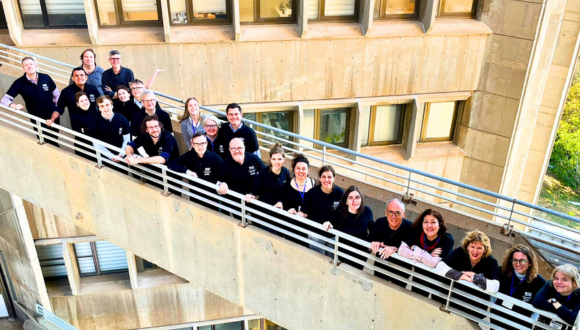The German translation of 'Disaster by Choice'

Select all
Archeology
Life Sciences
Medicine
Select all
Events
In Focus
Honors
Innovations

Research
The German translation of 'Disaster by Choice'

We are excited to announce the German translation of Ilan Kelman’s impactful book, Disaster by Choice, now available as Katastrophen aus Menschenhand, published by Springer Nature Group. This essential work challenges the conventional narrative of natural disasters by highlighting the human choices that often transform natural hazards into catastrophic events. With insights grounded in decades of disaster research, the book encourages readers to rethink how we can act to prevent and mitigate the impact of disasters.
Translating this thought-provoking book was a joint effort led by Dr. Patrizia Glick and Mrs. Kristina Geva from ResWell. Patrizia and Kristina, with their expertise in Disaster and Emergency Management, brought precision and clarity to the translation, ensuring that the German edition faithfully reflects Kelman’s powerful message while maintaining accessibility. The translation captures the depth of Kelman’s analysis, examining how social, political, and economic decisions shape our responses to natural hazards.
Katastrophen aus Menschenhand is now available for German-speaking readers eager to explore the crucial role of human decision-making in disaster prevention: German Translation
The original version in English can be found here: English Version

Research
A progress report on coping amidst the ongoing conflict in Israel

This paper marks the second phase of ResWell's study, conducted seven weeks into the war in Gaza. Our team explored the resilience of the population and coping measures amid the ongoing conflict. Examining data collected between October 11 to 15, 2023, and November 10 to 15, 2023, from the same sample of 2,002 respondents, the focus included national resilience, community and individual resilience, and coping indicators such as hope, morale, social cohesion, distress symptoms, and perceptions of threat.
The findings reveal a significant decrease in general national resilience, community resilience, and perceived social cohesion, while positive coping indices, including individual resilience, hope, and morale, increased. Classifying respondents by government support highlighted unique patterns, emphasizing the importance of considering public sentiment in decision-making. The study underscores both signs of recovery and concerns about declining public resilience, urging attention from policymakers.
Access the summary here.

Research
Sharing our expertise for resilience in the face of conflict

In June, Prof. Shaul Kimhi, co-founder of ResWell, attended the National Military Behavioral Sciences Conference with International Participation in Romania. The conference focused on "The Psychological Dimension of Current Conflicts: Between Risk and Resilience."
Prof. Kimhi presented ResWell's latest research on resilience among Ukrainians and neighboring communities, offering insights into how these populations are navigating and building resilience during times of conflict.
Read more about Prof. Kimhi and find all his publications here: Biography Kimhi

Research
A Webinar

During the insightful webinar held on April 25th, Prof. Gerry Leisman led an exploration into "The Neuroscience of Resilience." The session provided a deep dive into the relationship between the VUCAH framework and human resilience. Prof. Leisman offered valuable insights into how the human brain processes and responds to volatility, uncertainty, complexity, ambiguity, and hyper-connectivity, illuminating the biological underpinnings of decision-making in uncertain contexts.
Throughout the one-hour session, practical strategies for nurturing resilience were unveiled, grounded in the latest scientific understanding of neuroplasticity. Participants left empowered with actionable insights to apply in their respective domains, whether in mental health, education, or organizational management. By emphasizing the application of neuroscience principles, the webinar underscored the transformative potential of integrating resilience-building practices into various facets of life.
You can watch the replay of the webinar here: Replay

Research
Coping Mechanisms and Collective Strength

The research report examines the resilience and coping mechanisms of the Jewish population in Israel during the "Iron Swords" war, which began with a Hamas attack on Jewish settlements near the Gaza Strip border on October 7th, 2023. The study collected data from 2,002 Hebrew-speaking adults shortly after the attack and categorized them into three groups based on their level of support for the government.
The findings show that national and individual resilience and hope were higher in the current study than in a previous measurement from August 2023. Still, distress symptoms and a sense of danger were also higher while morale was lower. Factors like hope and support for the government significantly predicted national resilience. There were variations in the levels of resilience, hope, and distress symptoms between supporters of the government, neutrals, and opponents of the government, reflecting a complex and challenging situation in Israel during this conflict.
For the full text of the report, you can access it here.

Research
Read the publication of our Ukraine research

We are delighted to present the most recent publications, centered around our in-depth research conducted in Ukraine. The collective body of work offers profound insights into the multifaceted aspects of building resilient societies. Through rigorous analysis and evidence-based exploration, these publications shed light on strategies, mechanisms, and factors contributing to societal resilience and individual flourishing. To access these valuable resources, we encourage interested parties to utilize the provided links.
 Eshel, Y., Kimhi, S., Marciano, H., & Adini, B. (2023). Predictors of PTSD and psychological distress symptoms of Ukraine civilians during war. Disaster medicine and public health preparedness, 17, e429: https://pubmed.ncbi.nlm.nih.gov/37435730/
Eshel, Y., Kimhi, S., Marciano, H., & Adini, B. (2023). Predictors of PTSD and psychological distress symptoms of Ukraine civilians during war. Disaster medicine and public health preparedness, 17, e429: https://pubmed.ncbi.nlm.nih.gov/37435730/
 Kimhi, S., Eshel, Y., Marciano, H., & Adini, B. (2023). Impact of the war in Ukraine on resilience, protective, and vulnerability factors. Frontiers in Public Health, 11, 1053940: https://www.frontiersin.org/articles/10.3389/fpubh.2023.1053940/full
Kimhi, S., Eshel, Y., Marciano, H., & Adini, B. (2023). Impact of the war in Ukraine on resilience, protective, and vulnerability factors. Frontiers in Public Health, 11, 1053940: https://www.frontiersin.org/articles/10.3389/fpubh.2023.1053940/full
 Kimhi, S., Kaim, A., Bankauskaite, D., Baran, M., Baran, T., Eshel, Y., ... & Adini, B. (2023). A full-scale Russian invasion of Ukraine in 2022: Resilience and coping within and beyond Ukraine. Applied Psychology: Health and WellBeing.: https://pubmed.ncbi.nlm.nih.gov/37424002/
Kimhi, S., Kaim, A., Bankauskaite, D., Baran, M., Baran, T., Eshel, Y., ... & Adini, B. (2023). A full-scale Russian invasion of Ukraine in 2022: Resilience and coping within and beyond Ukraine. Applied Psychology: Health and WellBeing.: https://pubmed.ncbi.nlm.nih.gov/37424002/
 Kimhi, S., Baran, M., Baran, T., Kaniasty, K., Marciano, H., Eshel, Y., & Adini, B. (2023). Prediction of societal and community resilience among Ukrainian and Polish populations during the Russian war against Ukraine. International Journal of Disaster Risk Reduction, 103792.: https://doi.org/10.1016/j.ijdrr.2023.103792
Kimhi, S., Baran, M., Baran, T., Kaniasty, K., Marciano, H., Eshel, Y., & Adini, B. (2023). Prediction of societal and community resilience among Ukrainian and Polish populations during the Russian war against Ukraine. International Journal of Disaster Risk Reduction, 103792.: https://doi.org/10.1016/j.ijdrr.2023.103792
It is our sincere hope that these scholarly contributions will prove instrumental in advancing the understanding and formulation of strategies to foster resilient communities, ultimately leading to enhanced wellbeing and a more sustainable future for societies worldwide.

Research
A holistic disaster response

In January, one of our ResWell founders, Prof, Bruria Adini, hosted a consortium of the European Union’s Horizon 2020 project ENGAGE at Tel Aviv University.
The ENGAGE team aims to increase societal resilience and risk awareness around the globe. The focus lies on analyzing past natural emergencies, terrorist attacks, and man-made disasters to understand how citizens respond to formal intervention practices during adverse times. Working closely with experts in the field, they are developing emergency response strategies to improve communication and coordination between the public and rescuers, authorities and informal groups during crises. The goal is to bridge any gaps that exist between formal and informal guidelines in specific contexts and to ensure a swift and effective response.
During the consortium, Prof. Adini showed the team relevant strategic sites in Israel and introduced them to some of Israel's key players in emergency and disaster management. The group visited, for instance, the headquarters of the Israeli Trauma coalition, where they gained valuable insights into the Israeli approach to handling adverse events and improving societal resilience in Israel.